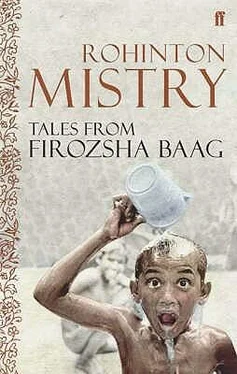Rohinton Mistry - Tales From Firozsha Baag
Здесь есть возможность читать онлайн «Rohinton Mistry - Tales From Firozsha Baag» весь текст электронной книги совершенно бесплатно (целиком полную версию без сокращений). В некоторых случаях можно слушать аудио, скачать через торрент в формате fb2 и присутствует краткое содержание. Год выпуска: 2006, Издательство: Faber & Faber, Жанр: Современная проза, на английском языке. Описание произведения, (предисловие) а так же отзывы посетителей доступны на портале библиотеки ЛибКат.
- Название:Tales From Firozsha Baag
- Автор:
- Издательство:Faber & Faber
- Жанр:
- Год:2006
- ISBN:нет данных
- Рейтинг книги:3 / 5. Голосов: 1
-
Избранное:Добавить в избранное
- Отзывы:
-
Ваша оценка:
- 60
- 1
- 2
- 3
- 4
- 5
Tales From Firozsha Baag: краткое содержание, описание и аннотация
Предлагаем к чтению аннотацию, описание, краткое содержание или предисловие (зависит от того, что написал сам автор книги «Tales From Firozsha Baag»). Если вы не нашли необходимую информацию о книге — напишите в комментариях, мы постараемся отыскать её.
Tales From Firozsha Baag — читать онлайн бесплатно полную книгу (весь текст) целиком
Ниже представлен текст книги, разбитый по страницам. Система сохранения места последней прочитанной страницы, позволяет с удобством читать онлайн бесплатно книгу «Tales From Firozsha Baag», без необходимости каждый раз заново искать на чём Вы остановились. Поставьте закладку, и сможете в любой момент перейти на страницу, на которой закончили чтение.
Интервал:
Закладка:
Suddenly, remembering was extremely important, a deep-seated need surfacing, manifesting itself in Daulat’s flat. All her life those closest to her had reminisced about events from their lives; she, the audience, had listened, sometimes rapt, sometimes impatient. Grandmother would sit her down and tell stories from years gone by; the favourite one was about her marriage and the elaborate matchmaking that preceded it. Mother would talk about her Girl Guide days, with a faraway look in her eyes; she still had her dark blue Girl Guide satchel, faded and frayed.
When grandmother had died no music was allowed in the house for three months. Even the neighbours, in all three blocks, had silenced their radios and gramophones for ten days. No one was permitted to play in the compound for a month. In those old days, the compound was not flagstoned, and clouds of dust were raised by the boys of Firozsha Baag as they tore about playing their games. The greatest nuisance was, of course, to the ground floor: furniture dusted and cleaned in the morning was recoated by nightfall. The thirty-day interdiction against games was a temporary reprieve for those tenants. That month, membership in the Cawasji Framji Memorial Library rose, and grandmother’s death converted several boys in the Baag to reading. During that time, Daulat’s mother introduced her to kitchen and cooking — there was now room for one more in that part of the flat.
Daulat had become strangers with her radio shortly after Minocher’s illness started. But the childhood proscription against music racked her with guilt whenever a strand of melody strayed into her room from the outside world. Minocher’s favourite song was “At the Balalaika.” He had taken her to see Balalaika starring Nelson Eddy at a morning show. It was playing at the Eros Cinema, it was his fourth time, and he was surprised that she had never seen the film before. How did the song … she hummed it, out of tune: At the Balalaika, one summer night a table laid for two, was just a private heaven made for two …
The wick of the oil lamp crackled. It did this when the oil was low. She fetched the bottle and filled the glass, shaking out the last drop, then placed the bottle on the windowsill: a reminder to replenish the oil.
Outside, the peripatetic vendors started to arrive, which meant it was past three o’clock. Between one and three was nap time, and the watchman at the gate of Firozsha Baag kept out all hawkers, according to the instructions of the management. The potato-and-onion man got louder as he approached now, “Onions rupee a kilo, potatoes two rupees,” faded after he went past, to the creaky obligato of his thirsty-for-lubrication cart as it jounced through the compound. He was followed by the fishwalli, the eggman, the biscuitwalla; and the ragman who sang with a sonorous vibrato:
Of old saris and old clothes I am collector,
Of new plates and bowls in exchange I am giver…
From time to time, B.E.S.T. buses thundered past and all sounds were drowned out. Finally came the one Daulat was waiting for. She waved the empty bottle at the oilwalla, purchased a quarter litre, and arranged with him to knock at her door every alternate day. She was not yet sure when she would be ready to let the lamp go out.
The clock showed half past four when she went in with the bottle. Minocher’s things lay in neat brown paper packages, ready for the Old-Age Home. She shut the doors of the cupboards now almost empty; the clothes it took a man a lifetime to wear and enjoy, she thought, could be parcelled away in hours.
The man would soon arrive to see Minocher’s pugree. She wondered what it was that had made him go to the trouble of advertising. Perhaps she should never have telephoned. Unless he had a good reason, she was not going to part with it. Definitely not if he was just some sort of collector.
The doorbell. Must be him, she thought, and looked through the peephole.
But standing outside were second cousin Moti and her two grandsons. Moti had not been at the funeral. Daulat did not open the door immediately. She could hear her admonishing the two little boys: “Now you better behave properly or I will not take you anywhere ever again. And if she serves Goldspot or Vimto or something, be polite, leave some in the glass. Drink it all and you’ll get a pasting when you get home.”
Daulat had heard enough. She opened the door and Moti, laden with eau de cologne, fell on her neck with properly woeful utterances and tragic tones. “O Daulat, Daulat! What an unfortunate thing to happen to you! O very wrong thing has come to pass! Poor Minocher gone! Forgive me for not coming to the funeral, but my Gustadji’s gout was so painful that day. Completely impossible. I said to Gustadji, least I can do now is visit you soon as possible after dusmoo!’
Daulat nodded, trying to look grateful for the sympathy Moti was so desperate to offer to fulfil her duties. It was almost time to reach for her imaginary cassette player.
“Before you start thinking what a stupid woman I am to bring two little boys to a condolence visit, I must tell you that there was no one at home they could stay with. And we never leave them alone. It is so dangerous. You heard about that vegetablewalla in Bandra? Broke into a flat, strangled a child, stole everything. Cleaned it out completely. Parvar Daegar! Save us from such wicked madmen!”
Daulat led the way into the living-room, and Moti sat on the sofa. The boys occupied Najamai’s loaned chairs. The bedroom door was open just a crack, revealing the oil lamp with its steady unwavering flame. Daulat shut it quickly lest Moti should notice and comment about the unorthodoxy of her source of comfort.
“Did he suffer much before the end? I heard from Ruby — you know Ruby, sister of Eruch Uncle’s son-in-law Shapur, she was at the funeral — that poor Minocher was in great pain the last few days.”
Daulat reached in her mind for the start switch of the cassette player. But Moti was not yet ready: “Couldn’t the doctors do something? From what we hear these days, they can cure almost anything.”
“Well,” said Daulat, “our doctor was very helpful, but it was a hopeless case, he told me, we were just prolonging the agony.”
“You know, I was reading in the Indian Express last week that doctors in China were able to make” — here, Moti lowered her voice in case the grandsons were listening, shielded her mouth with one hand, and pointed to her lap with the other — “a man’s Part. His girlfriend ran off with another man and he was very upset. So he chopped off” — in a whisper — “his own Part, in frustration, and flushed it down the toilet. Later, in hospital, he regretted doing it, and God knows how, but the doctors made for him” — in a whisper again — “a New Part, out of his own skin and all. They say it works and everything. Isn’t that amazing?”
“Yes, very interesting,” said Daulat, relieved that Moti had, at least temporarily, forsaken the prescribed condolence visit questioning.
The doorbell again. Must be the young man for the pugree this time.
But in stepped ever-solicitous Najamai. “Sorry, sorry. Very sorry, didn’t know you had company. Just wanted to see if you were okay, and let you know I was back. In case you need anything.” Then leaning closer conspiratorially, rancid-fat- dhansaak-masala odours overwhelming Daulat, she whispered, “Good thing, no, I brought the extra chairs.”
Daulat calculated quickly. If Najamai stayed, as indeed she was eager to, Moti would drift even further from the purpose of her visit. So she invited her in. “Please come and sit, meet my second cousin Moti. And these are her grandsons. Moti was just now telling me a very interesting case about doctors in China who made” — copying Moti’s whisper — “a New Part for a man.”
Читать дальшеИнтервал:
Закладка:
Похожие книги на «Tales From Firozsha Baag»
Представляем Вашему вниманию похожие книги на «Tales From Firozsha Baag» списком для выбора. Мы отобрали схожую по названию и смыслу литературу в надежде предоставить читателям больше вариантов отыскать новые, интересные, ещё непрочитанные произведения.
Обсуждение, отзывы о книге «Tales From Firozsha Baag» и просто собственные мнения читателей. Оставьте ваши комментарии, напишите, что Вы думаете о произведении, его смысле или главных героях. Укажите что конкретно понравилось, а что нет, и почему Вы так считаете.












